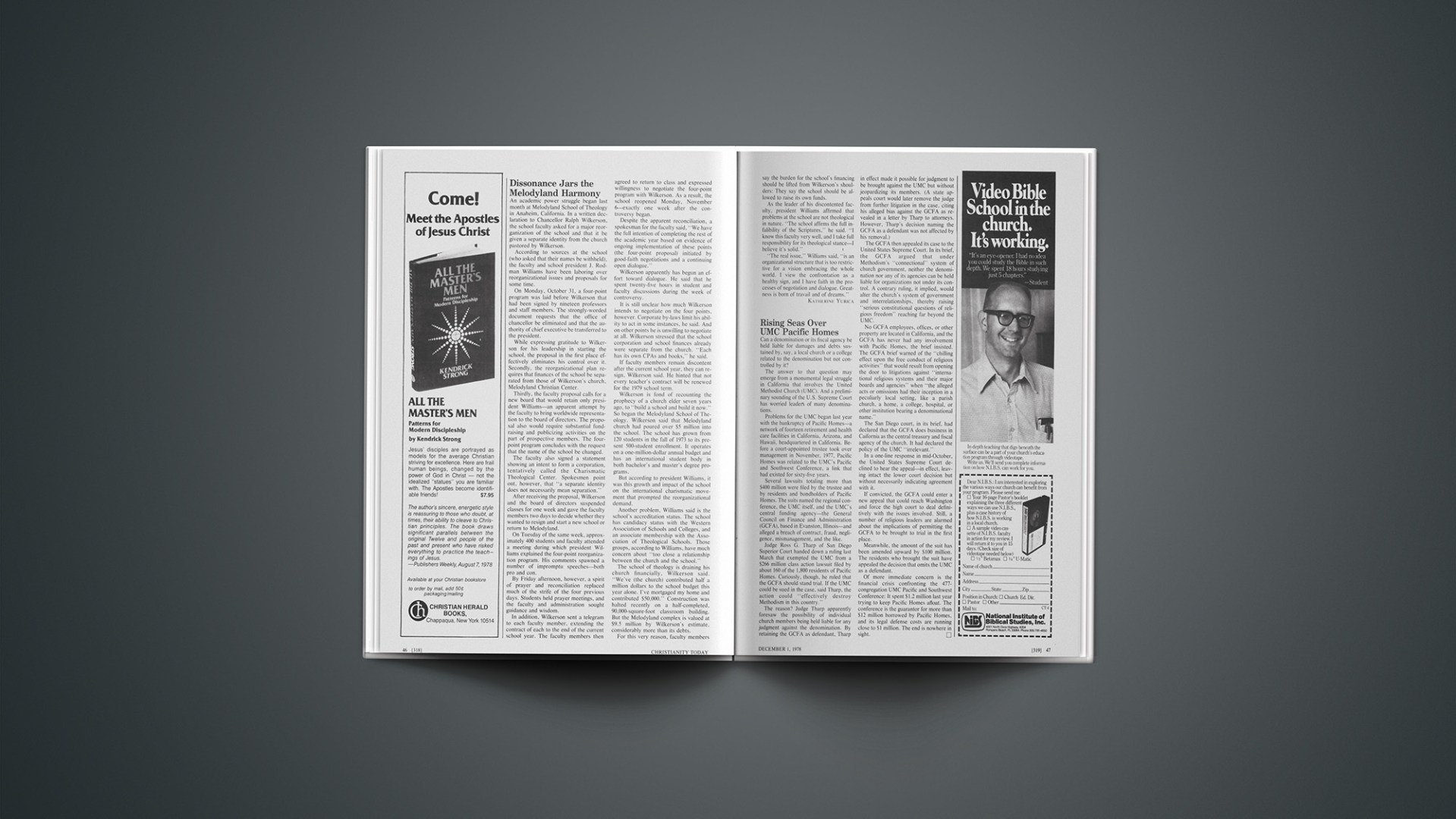An academic power struggle began last month at Melodyland School of Theology in Anaheim, California. In a written declaration to Chancellor Ralph Wilkerson, the school faculty asked for a major reorganization of the school and that it be given a separate identity from the church pastored by Wilkerson.
According to sources at the school (who asked that their names be withheld), the faculty and school president J. Rodman Williams have been laboring over reorganizational issues and proposals for some time.
On Monday, October 31, a four-point program was laid before Wilkerson that had been signed by nineteen professors and staff members. The strongly-worded document requests that the office of chancellor be eliminated and that the authority of chief executive be transferred to the president.
While expressing gratitude to Wilkerson for his leadership in starting the school, the proposal in the first place effectively eliminates his control over it. Secondly, the reorganizational plan requires that finances of the school be separated from those of Wilkerson’s church, Melodyland Christian Center.
Thirdly, the faculty proposal calls for a new board that would retain only president Williams—an apparent attempt by the faculty to bring worldwide representation to the board of directors. The proposal also would require substantial fund-raising and publicizing activities on the part of prospective members. The four-point program concludes with the request that the name of the school be changed.
The faculty also signed a statement showing an intent to form a corporation, tentatively called the Charismatic Theological Center. Spokesmen point out, however, that “a separate identity does not necessarily mean separation.”
After receiving the proposal, Wilkerson and the board of directors suspended classes for one week and gave the faculty members two days to decide whether they wanted to resign and start a new school or return to Melodyland.
On Tuesday of the same week, approximately 400 students and faculty attended a meeting during which president Williams explained the four-point reorganization program. His comments spawned a number of impromptu speeches—both pro and con.
By Friday afternoon, however, a spirit of prayer and reconciliation replaced much of the strife of the four previous days. Students held prayer meetings, and the faculty and administration sought guidance and wisdom.
In addition, Wilkerson sent a telegram to each faculty member, extending the contract of each to the end of the current school year. The faculty members then agreed to return to class and expressed willingness to negotiate the four-point program with Wilkerson. As a result, the school reopened Monday, November 6—exactly one week after the controversy began.
Despite the apparent reconciliation, a spokesman for the faculty said, “We have the full intention of completing the rest of the academic year based on evidence of ongoing implementation of these points (the four-point proposal) initiated by good-faith negotiations and a continuing open dialogue.”
Wilkerson apparently has begun an effort toward dialogue. He said that he spent twenty-five hours in student and faculty discussions during the week of controversy.
It is still unclear how much Wilkerson intends to negotiate on the four points, however. Corporate by-laws limit his ability to act in some instances, he said. And on other points he is unwilling to negotiate at all. Wilkerson stressed that the school corporation and school finances already were separate from the church. “Each has its own CPAs and books,” he said.
If faculty members remain discontent after the current school year, they can resign, Wilkerson said. He hinted that not every teacher’s contract will be renewed for the 1979 school term.
Wilkerson is fond of recounting the prophecy of a church elder seven years ago, to “build a school and build it now.” So began the Melodyland School of Theology. Wilkerson said that Melodyland church had poured over $5 million into the school. The school has grown from 120 students in the fall of 1973 to its present 500-student enrollment. It operates on a one-million-dollar annual budget and has an international student body in both bachelor’s and master’s degree programs.
But according to president Williams, it was this growth and impact of the school on the international charismatic movement that prompted the reorganizational demand.
Another problem, Williams said is the school’s accreditation status. The school has candidacy status with the Western Association of Schools and Colleges, and an associate membership with the Association of Theological Schools. Those groups, according to Williams, have much concern about “too close a relationship between the church and the school.”
The school of theology is draining his church financially, Wilkerson said. “We’ve (the church) contributed half a million dollars to the school budget this year alone. I’ve mortgaged my home and contributed $50,000.” Construction was halted recently on a half-completed, 90,000-square-foot classroom building. But the Melodyland complex is valued at $9.5 million by Wilkerson’s estimate, considerably more than its debts.
For this very reason, faculty members say the burden for the school’s financing should be lifted from Wilkerson’s shoulders: They say the school should be allowed to raise its own funds.
As the leader of his discontented faculty, president Williams affirmed that problems at the school are not theological in nature. “The school affirms the full infalibility of the Scriptures,” he said. “I know this faculty very well, and I take full responsibility for its theological stance—I believe it’s solid.”
“The real issue,” Williams said, “is an organizational structure that is too restrictive for a vision embracing the whole world. I view the confrontation as a healthy sign, and I have faith in the processes of negotiation and dialogue. Greatness is born of travail and of dreams.”










